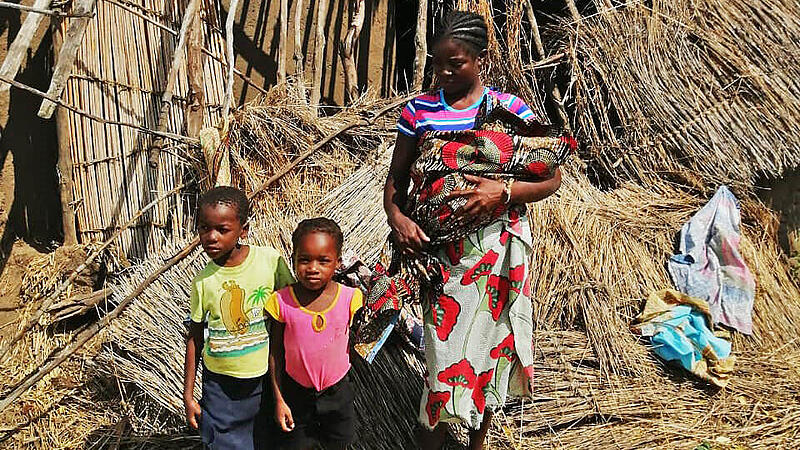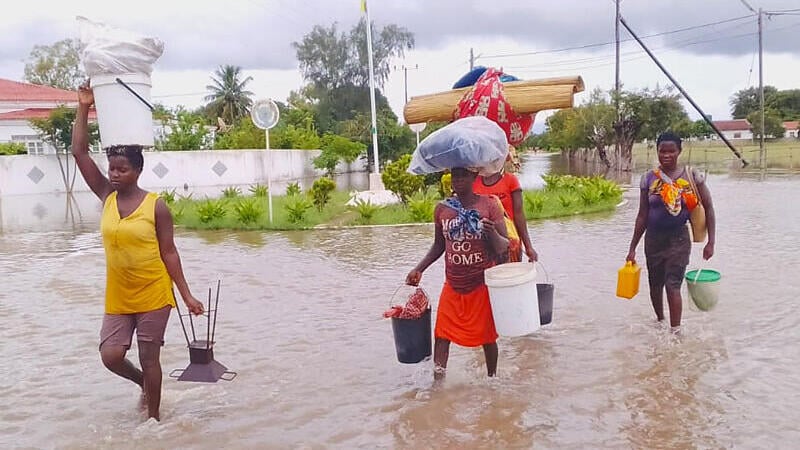Image: ESMABAMA

Image: Be So Free
“In 2019 it was Cyclone Idai, now it’s Freddy”, Franz Hehenberger is appalled by the natural disaster that hit Mozambique, a country in southern Africa, a few weeks ago. The managing director of the development policy organization of the Catholic men’s movement, “Be So Free”had only visited the aid projects in the country in February. “People still told me about their hopeful plans for the future.”
Now the people have to fight for pure survival again. “We have to start our life over again. Without help we would be lost”, says Amelia Bartolomeu. The woman is the head of a family of 12 in Machanga, Sofala province. Her husband works in South Africa to support the family. “Our home was partially destroyed by the floods and we lost most of our crops”she says.

Image: Be So Free
“Another year of hunger”
The house of the Chalpa family was completely destroyed. Ernesto, the head of the family of ten, is currently concentrating on finding wooden stakes and straw to rebuild his house and otherwise works in his fields almost around the clock in order to be able to harvest something again in a few months.
Both families are supported by the aid organization “ESMABAMA”with the “Be So Free” has been working together for more than 20 years. The name of the NGO is composed of the first letters of the four mission stations Estaquinha, Mangunde, Barada and Machanga. “Many people have nothing to eat”, says Mateus Machaela, head of the Machanga Mission. The number of malaria and diarrheal diseases is currently increasing by leaps and bounds. “We will see another year of famine here because most of the crops have been lost”says Pietro Ferlito, director of “ESMABAMA”. And his deputy Edson Balata adds: “At the moment there is no government support for the families.”
Education
Try this life-threatening deficiency “ESMABAMA” and “Be So Free”as best as possible to meet. “ESMABAMA” has been running schools (elementary, middle and agricultural schools), accommodation, farms, bakeries and health stations in the three southern districts of Sofala province (around 500,000 inhabitants) for almost 30 years. In addition, the surrounding villages and settlements are looked after from the four stations.
The focus of the help is currently in the areas of adult education and agriculture. A majority of people cannot read and write. “Women are particularly affected”says Hehenberger. “In order to catch up on the education that was mostly missed due to the civil war (1977 to 1992, editor’s note), many attend the ‘school under the shade tree’ and learn the official language Portuguese, mathematics and many practical, life-enhancing things in the middle of the bush.” In the Estaquinha station alone, 2,000 people are taught in a primary and secondary school. “ESMABAMA” looks after a total of 28 literacy centers with 34 teachers.
In the Estaquinha station, Hehenberger also visited the bakery. Up to 600 pieces of white bread are produced there every day. A piece costs the equivalent of seven cents.
“Alone they would have no chance”
Hehenberger also visited the agricultural project near Mangunde. In the village of Jambe he could meet the people of the group “Kushinga” (means something like being strong) to speak. The aim of the project is to bring the villagers together “to be able to farm better in the face of climate change. They know they wouldn’t stand a chance alone.” Field work has priority. The main product is still corn. In the meantime, however, sweet potatoes, cassava and beans are also grown.
“The 30 members of the group were given a team of draft animals to work the fields, as well as tools, technical support and training to consolidate production”, says Hehenberger. Pest control is organically operated in Jambe. “Different leaves from trees are put in water, mixed with chilli, which is then sprayed onto the corn with a hand sprayer.” This does not destroy the pests, but the unpleasant smell drives them away.
In order to be able to continue to help people, “Be So Free” but donations. A payment slip is enclosed with this issue of the OÖ Nachrichten. For just 25 euros, a family of seven can get flour, beans and oil for a week; 35 euros finance seeds for a family to replant destroyed fields.
- “Be So Free”, Donation to Mozambique: AT30 5400 0000 0069 1733
Source: Nachrichten




